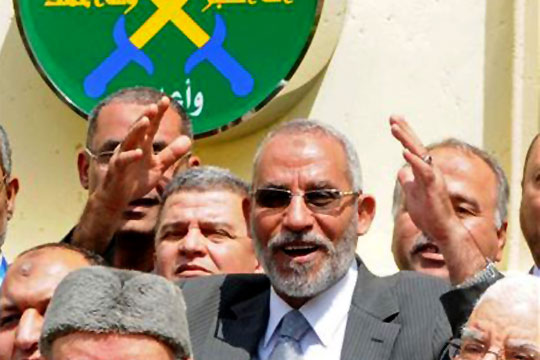Latest NEWS
- Aswat Masriya, the last word
- Roundup of Egypt's press headlines on March 15, 2017
- Roundup of Egypt's press headlines on March 14, 2017
- Former Egyptian President Hosni Mubarak to be released: lawyer
- Roundup of Egypt's press headlines on March 13, 2017
- Egypt's capital set to grow by half a million in 2017
- Egypt's wheat reserves to double with start of harvest -supply min
- Roundup of Egypt's press headlines on March 12, 2017
Brotherhood wants "Islamic" president for Egypt

Supreme leader of the Muslim Brotherhood, Mohamed Badie - Mohamed AbdelGhany/Reuters
The influential Muslim Brotherhood wants an Egyptian president with an "Islamic background", its leader said, comments that would appear to rule out its support for a leading liberal like Amr Moussa in the forthcoming presidential election.
The Brotherhood won more seats than any other party in recent parliamentary elections and its capacity to mobilize voters will be an asset in Egypt's first competitive presidential race.
Mohamed Badie, the Brotherhood leader, said in remarks published on Tuesday his group would back a candidate for the presidency, but it had yet to decide who. The group has said it will not field one of its own for the post held by Hosni Mubarak for three decades until he was toppled a year ago.
"The candidate that we support will not be a candidate who belongs to a particular Islamist movement, or we would have run ourselves," Badie said in an interview with the Freedom and Justice newspaper, the Brotherhood's political party daily. But "the candidate must have an Islamic background".
The Brotherhood had yet to discuss who it would back, he said, adding that the group would study the programmes of all candidates and draw up a short list.
"In the end, the group's advisory council will decide to support one of those candidates specifically."
Presidential hopefuls will be able to submit their candidacies from March 10, though the election date has yet to be set. The council of ruling generals has said they will hand power to the new head of state at the end of June.
"It's clear now the Brotherhood are willing to throw their weight into the ring. That will have major implications for the race," said Shadi Hamid, an expert on Islamist groups based at the Brookings Doha Center.
BARGAINING POSITION?
The phrase "Islamic background", while vague, would appear to rule out Brotherhood support for a candidate like Amr Moussa, seen as one of the frontrunners for the presidency. A former Egyptian foreign minister and Arab League secretary general, Moussa describes himself as a liberal nationalist.
Since army officers overthrew the monarch in 1952, all of Egypt's presidents have hailed from the military.
The Brotherhood's preference for president has been seen as one area of potential friction with the military. Analysts say the military wants a head of state who will preserve privileges the army has enjoyed since the monarchy was overthrown.
Badie called for the preparation of a new constitution in parallel with steps towards the presidential election. He said the Brotherhood was working to reduce presidential powers "so that we do not produce another pharaoh".
Nabil Abdel Fattah, a political analyst, saw Badie's remark as a sign the group wanted a candidate close to its way of thinking, if not from its ranks, and described it as an opening negotiating position with the military over the president.
"It's an attempt to improve the cards the Muslim Brotherhood has for bargaining vis-a-vis the SCAF (Supreme Council of the Armed Forces," he said.
The Brotherhood's decision not to contest the presidency may reflect an effort to reassure those at home and abroad worried by the prospect of Islamist domination in the Arab world's most populous, traditionally most influential state.
Among the Islamists seeking to be candidates are Abdel Moneim Abol Fotoh, a leading Brotherhood figure until he was expelled from the group last year over his decision to break ranks and run for the presidency.
Some analysts say lingering bad blood between the Brotherhood and Abol Fotoh will preclude its backing for him.
But he still commands respect among sections of the movement and his campaign received a boost last week from a high-profile cleric seen as close to the Brotherhood. Sheikh Yousef al-Qaradawi, an Egyptian cleric based in Qatar, described Abol Fotoh as the best of the candidates to have emerged so far.
An ultraconservative Salafi, Hazem Salah Abu Ismail, is also planning to run. The Nour Party, the Salafi party which came second to the Brotherhood in the parliamentary election, has yet to say who it will back for the presidency. Like the Brotherhood, it is not planning to field its own candidate.
(Editing by Mark Heinrich)










